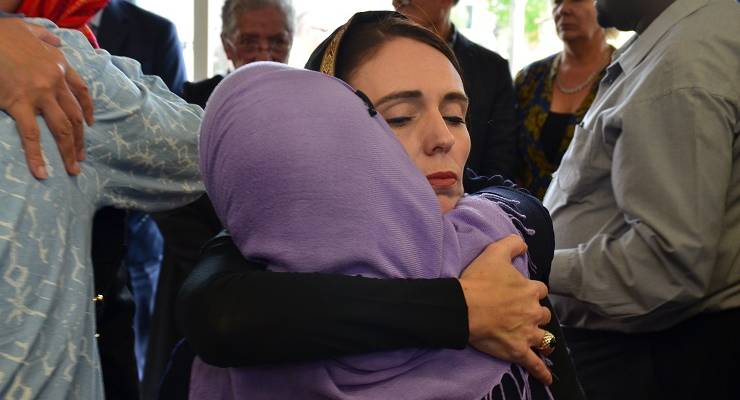
As is often the case a few months after horrifying events, the Christchurch massacre is now producing long, in-depth written features looking at just how this could happen. In a vivid and chilling piece for GQ, writer Sean Flynn details the events of the day, in March of this year, when an Australian white supremacist killed 51 Muslims at Al Noor mosque. The story names victims and survivors, but the killer is only ever referred to as “the Australian”.
As such, it adheres to the call from New Zealand Prime Minister Jacinda Ardern that the focus of any reporting be on the victims, not the perpetrator. “He is a terrorist. He is a criminal. He is an extremist. But he will, when I speak, be nameless. And to others, I implore you: speak the names of those who were lost rather than the name of the man who took them,” she said, five days after the massacre.
It’s not just Ardern who has asked the media to deny mass killers the notoriety they crave. In the aftermath of the 2017 mass shooting in Las Vegas, a group of 147 academics, law enforcement officials, public health experts and others wrote an open letter begging US media outlets to deny infamy to mass shooters by withholding their names and likeness when reporting on their crimes.
Following the Las Vegas shooting, Emeritus Professor Paul Mullen — who has also interviewed the perpetrators of the Port Arthur and Hoddle Street massacres — told Crikey that notoriety was a driver for mass shooters, who are following a “script” they see in the coverage of previous mass shootings. Only one in 10 actually has a serious mental health issue, he said.
But the approach undertaken by GQ is extremely rare; the Christchurch shooter has had his face plastered on the front pages of The Advertiser, The Weekend West, The Daily Telegraph, The Courier-Mail and the Herald Sun. His name has been used in The Australian, The Guardian, across the Nine papers and in Crikey.
The ABC has had a mixed response; early on it published a piece explaining why it would not be sharing the Christchurch shooter’s “manifesto” — that piece avoided naming him or using his picture. Elsewhere, they have dug into his past and shared detailed information about his personal life, unrelated to the killing. Crikey understands the ABC approaches the decision on whether to name a killer on a case-by-case basis.
A spokesperson for The Sydney Morning Herald and The Age told Crikey the Nine papers’ policy was to name shooters, and that their editorial guidelines “cover off on issues to ensure these events are covered accurately and that graphic/extremist content is not published without proper safeguards and context”.
The publications in Australia who have been most diligent in avoiding the shooter’s name and image have been youth-oriented outlets like BuzzFeed and Junkee.
“It’s been fairly obvious for a while that these guys thrive on attention, and use that attention to spread their hateful messages. That’s why they post their diatribes online,” Junkee Media managing editor Rob Stott told Crikey.
“It wasn’t a huge decision for us to not use their names. Why would we give them that oxygen? We’d much rather focus on the victims and what can be done to prevent these atrocities in the future. We’ll always approach these questions on a case-by-case basis, but our starting point will always be that people who commit massacres don’t get to control their own narratives.”
On Wednesday last week — the Jewish holy day of Yom Kippur — a German man drove to a synagogue in the city of Halle in eastern Germany to kill as many Jewish people as he possible could. He succeeded in killing two people (neither in the synagogue) before he was arrested. In its details — he livestreamed his actions, posted a manifesto online and invoked the “white genocide” myth — the crime mimicked Christchurch almost exactly.
Editor’s note: Crikey will no longer be publishing the Christchurch shooter’s name.








Right call, Crikey. The man needs no publicity. He deserves only to sink into anonymous ignominy. If we need to have names, use those of the victims or their loved ones. Remind us of the tragic reality of these horrific crimes, not who the perpetrator was.
Good!
Fastidiously avoiding the shooter’s name appears to more like a primitive religious taboo than serious journalism.
“He who shall not be named”, to quote a certain book
Except that we are not fastidiously denying him notoriety. We are angrily denying him notoriety. Even if we are only following PM Arden’s request, we are supporting the outrage of the New Zealand people.